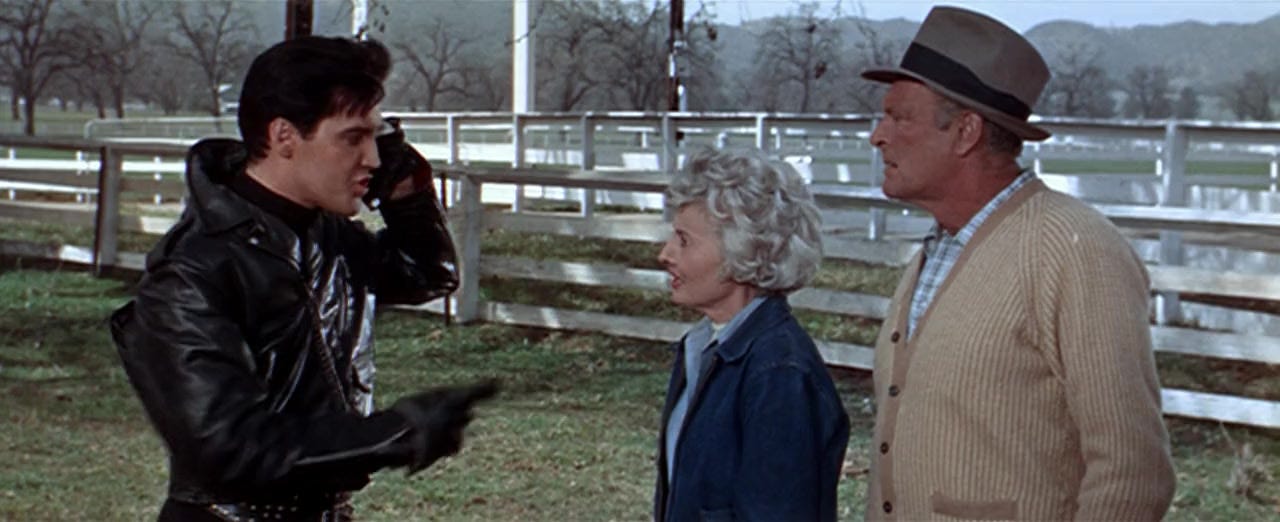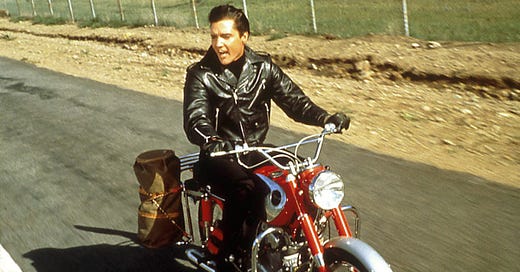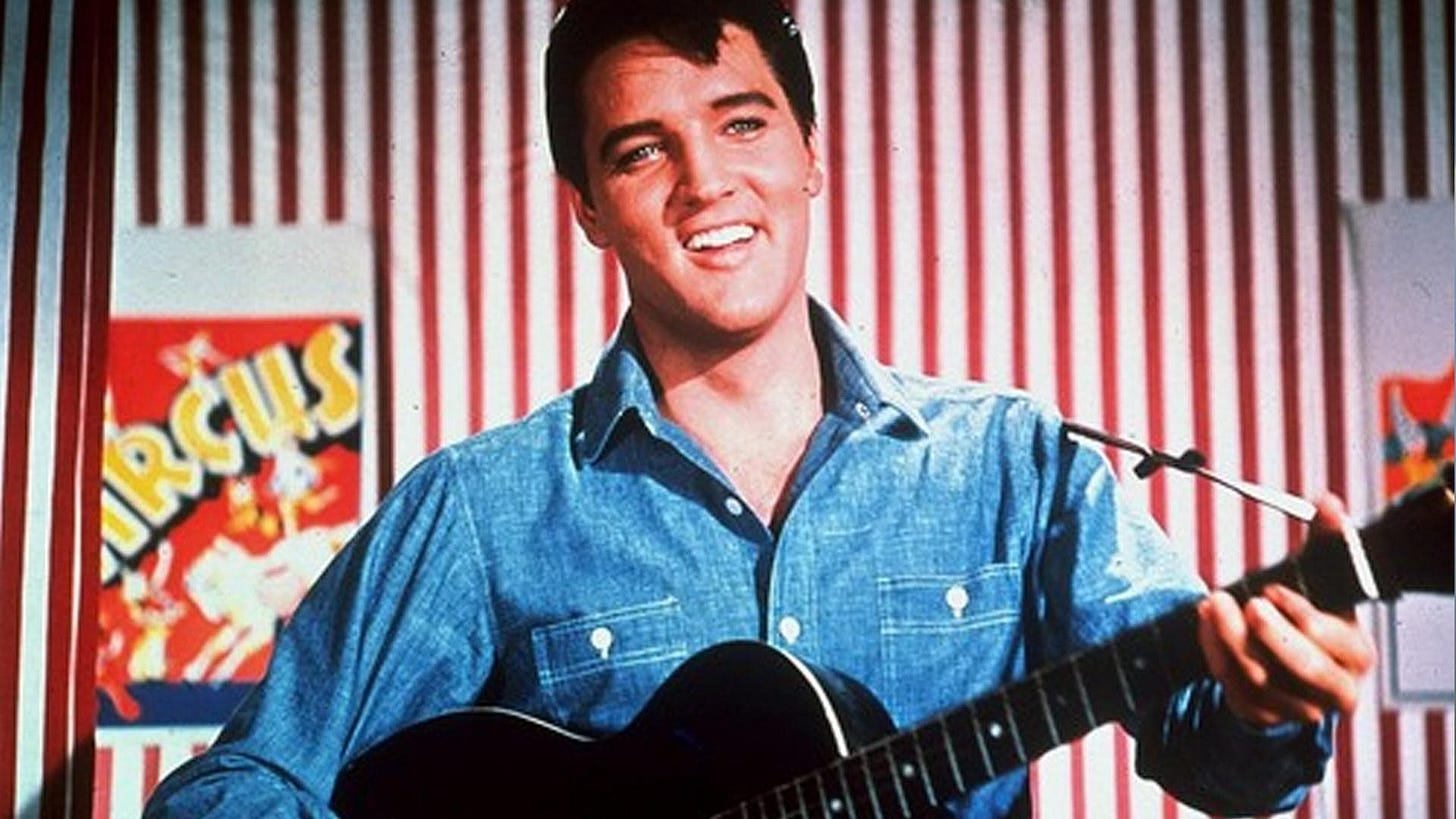Roustabout (1964)

Movie rating: 7/10
Reviewing an Elvis movie is a lot like reviewing a James Bond movie. Though there are outliers for each—in the case of Elvis his early, more dramatic efforts—overwhelmingly these are movies built on a successful formula. The main question tends to be how well each movie riffs on that formula and incorporates the expected elements. Critics have described the archetypal Elvis film as a musical comedy set in a glamorous location, in which our hero is a down-on-his-luck good guy who sings songs, romances beautiful women, and gets into fistfights before winning the big prize in the end.
By this measure, Roustabout is one of the more interesting takes on the standard Elvis vehicle. Elvis plays Charlie Rogers, a musician fired from his job at a local teahouse following a brawl with some college students. After a night in jail he takes off on his Honda motorcycle, but wrecks his bike in an accident with Joe Lean (Leif Erickson), his daughter Cathy (Joan Freeman) and their employer Maggie Morgan (Barbara Stanwyck), who oversees a struggling carnival. Maggie offers Charlie a place to stay and a job while he gets his bike fixed. Charlie’s singing talents, however, prove to be a major asset for Maggie’s carnival.

One of the more appealing aspects of Roustabout, directed by John Rich, is how it resurrects something of Elvis’s old rebel image—largely banished after his stint in the U.S. Army and dormant until the ’68 Comeback Special. Charlie dresses in leather, rides a motorycle, and is something of an outsider. Typically Elvis movies find the star in an idealized occupation like a racecar driver, hotel lifeguard, trapeze artist, pilot, or anything else that feels fun, escapist, and outside the drudgery of “normal” life. Roustabout is slightly more down-to-earth, with Elvis as a musician who loses his job and finds work as a casual labourer at a travelling carnival. The movie is less of a travelogue than many Elvis movies; rather than a beautiful exotic location like Hawaii, Charlie Rogers finds himself planted firmly in middle America, working at a carnival that could pop up in any small town.
The appeal of Elvis movies is based on the talent and charisma of their star. Quite simply, it’s fun to watch Elvis in these lighthearted star vehicles. In Roustabout, Elvis is our gateway into the carnival world, guiding us with his innate charm through this unique subculture. Elvis’s manager Colonel Tom Parker, being an ex-carnival worker, took a more hands-on approach than usual with this film, serving as a “technical consultant” whose stamp is indelibly felt with the movie’s immersion into carny lingo. Through Elvis we meet fire-eaters, sword-swallowers, bearded ladies, and carnival game operators.
As is typical for most Elvis and James Bond movies, we have two love interests for the hero: one more of a femme fatale and the other a romantic “true love”. Those roles here are portrayed respectively by Sue Ann Langdon as the fortune teller Madame Mijanou, and Joan Freeman as Cathy. Elvis ably flirts with both, and we’re reminded how much Elvis’s image as a sex symbol informed his film persona. Like Bond, Elvis’s characters embody a male fantasy of a handsome, charming hero who is very attractive to women and works in a highly physical and exciting profession. These idealized characters embody the kind of film that is less about an accurate portrayal of reality and more about living out the dreams of the audience. While I like all kinds of movies, as an Elvis fan, seeing Elvis in these escapist roles is inherently entertaining for me.
The songs are better than usual in Roustabout. "Poison Ivy League”, “Big Love, Big Heartache”, and “Little Egypt” are all highlights. A good sign of the latter’s quality was its inclusion in the ’68 Comeback Special for a number set in a bordello to convey Elvis’s sexiness (apparently, it was too successful in that regard, since the song was cut from the original NBC broadcast). “Roustabout” itself is one of the better title tracks for an Elvis movie. Its lyrics perfectly describe the rootless lifestyle of its hero, conveying a more wistful attitude than most Presley travelogues:
I'm just a roustabout
Shifted from town to town
No job can hold me down, I'm just a knock-around guy
There's a lot of space beneath that sky
Till I find my place there's no doubt...
I'll be a rovin' roustaboutCall me the carefree kind
I wander with the breeze
My mind and heart's at ease
Doing what pleases me best
Gotta keep-a movin' east or west
Till I find my place there's no doubt
I'll be a rovin' roustaboutAnd even if a pretty girl, should catch my eye
I'll give her a quick "hello", and a fast goodbyeI'll go the way I want
Driftin' just like the sand
Doin' what job I can
Changing my plans as I choose
Long as I keep happy I can't lose
Till I find my place there's no doubt
I'll be a rovin' roustabout
The biggest asset of the film other than Elvis himself is Barbara Stanwyck. In later Elvis vehicles, the quality of the supporting cast tended to decline, as much of the budget went to the star’s salary of $1 million per film. But Stanwyck is a true Hollywood legend—having portrayed the ultimate femme fatale in Double Indemnity, which remains my favourite film noir. Stanwyck’s charisma and acting skill make her a delight to watch, and her talent visibly elevates Elvis’s own performance. It’s wonderful to see these two interact onscreen together.
Like most Elvis movies, the plot of Roustabout is fairly routine and inconsequential. The fun here is in the songs and the charisma of the leads (plural for once). It’s a breezy 101 minutes that doesn’t demand too much of its audience, but manages to be solidly entertaining. Probably one of the better ’60s Elvis movies.




